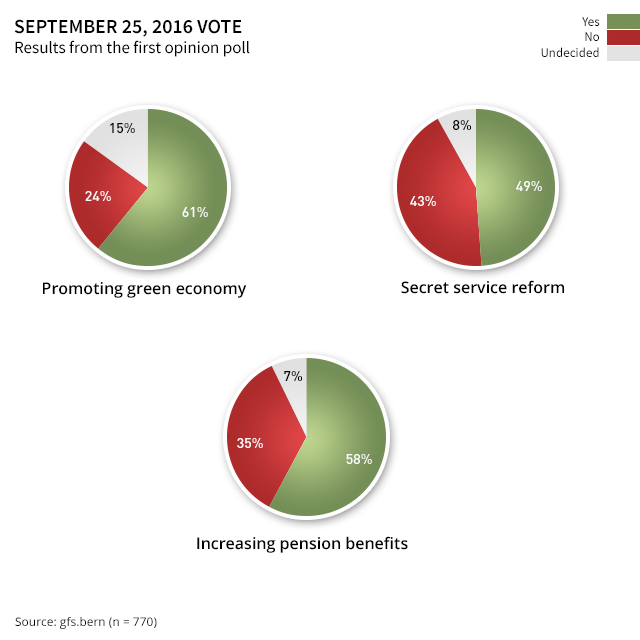
Fear of terrorism spurs secret service reform

The Swiss are expected to allow the government to weaken digital privacy laws in order to prevent terrorist attacks, according to an opinion poll seven weeks before a nationwide vote on the issue.
The legal amendment will give the intelligence service the greenlight to tap private emails and monitor other online activities.
The survey, published by the GfS Bern research and polling institute on Friday, found 58% of respondents coming out in favour of the change to the law, which was approved by parliament last year.
Opponents of the reform lag more than 20 percentage points behind, while 7% are still undecided. For details see graphic below.
“Barring a major scandal over the next few weeks the law will be accepted by voters,” says Claude Longchamp, political scientist and GfS Bern president. He reasoned that it had no chance at the ballot box because it only had the full support of the Green Party and Young Socialists.

Longchamp said even though the campaign of the leftwing opponents of the law got off to a promising start, their youthful enthusiasm was broken by both domestic and international events.
He refers to a “climate of fear in Europe” following a series of attacks by suspected Islamic militants and killing sprees by lone attackers in neighbouring France and Germany.
The campaign suffered an early setback when efforts to challenge another legal amendment on digital privacy failed. In that case, representatives of left as well as rightwing youth chapters of political parties were unable to collect enough signatures to fight plans to permit the justice authorities from installing computer surveillance programmes to prosecute serious crimes.
The planned reform of the intelligence law, as expected, has been a classic left-right political struggle, but Longchamp argues that above all, it’s proven to be “an issue that divides the younger and older generations”.
Digital natives want their privacy protected, while those born before the mid-1970s put collective security above individual privacy.
Concerns about too much state interference have also been pushed into the background, eclipsing the menace of a “snooping state” in the late 1980s.
Pollsters interviewed 1,212 Swiss citizens from all language regions across the country for the first of two nationwide surveys by the GfS Bern research institute ahead of the September 25 vote.
Swiss expatriates are not be included in the poll.
The telephone interviews took place between August 2-12. For the first time mobile phone users were included in the survey.
The margin of error is 2.9%.
The survey was commissioned by the Swiss Broadcasting Corporation, swissinfo’s parent company, and carried out by the leading GfS Bern research and polling institute.
Today, a majority of poll respondents appear to be convinced that laws need to be adapted to keep up with internet technology, and provide greater powers for the secret service to reduce the threat of terrorist attacks.
Green economy
The poll also questioned voters on their preferences for two other issues that will be decided at the ballot box on the same day.
A majority said they would support a Green Party initiative to reduce Switzerland’s ecological footprint.
Seven weeks ahead of the vote, supporters have a 37-point lead over their opponents. However, 15% of the respondents are still undecided.
“There seems to be broad support for a sustainable economy,” says political scientist Martina Mousson of the GfS polling institute. “Many citizens would also like to see Switzerland playing a pioneering role in environmental protection.”
The initiative committee wants Switzerland to limit the use of its natural resources, notably by boosting recycling. Its campaign has gained most support in the majority German-speaking part of the country, among women and – rather surprisingly – among the 65+ age group, researchers found.
However, Mousson says the No camp has only just launched its campaign. Opponents argue the initiative will undermine the economy and be a financial burden.
The pollsters say however that it is too early to predict the outcome of the vote.
Pension benefits
An initiative by the Trade Union Federation calling for a 10% increase in old age pension benefits also sees supporters ahead but only by 6% (49% to 43% with 8% still undecided).
The proposal pitches the left against the centre-right as the campaign gathers momentum. Political posters are vying for public attention and a nationwide demonstration is planned for next month in the capital Bern.
“On issues like old age pensions most people have already made up their minds based on their personal situation,” says Mousson.
Unsurprisingly, support for the initiative increases with the age of potential voters, while opposition generally rises with a high income.
It’s not the first time the Swiss have been asked to decide at the ballot box on reforms to state old age pension scheme. Over the past two decades, voters have rejected nine proposals – either to review its financing or to raise the retirement age to cope with an ageing population.
But it is the first time since 1995 that voters have the final say on a proposal to increase pension benefits.
Supporters say it is time to adapt the pension plan given that occupational pensions – the so called second pillar of Switzerland’s social security scheme – is also coming under financial pressure.
However, opponents argue the initiative, if approved, would be too costly. They also want to wait for the outcome of a major old age pension reform currently under discussion in parliament.
Pollsters expect turnout on September 25 to be average, around 45%.
The final GfS Bern poll, commissioned by the Swiss Broadcasting Corporation, swissinfo’s parent company, is due on September 14.

In compliance with the JTI standards
More: SWI swissinfo.ch certified by the Journalism Trust Initiative































You can find an overview of ongoing debates with our journalists here . Please join us!
If you want to start a conversation about a topic raised in this article or want to report factual errors, email us at english@swissinfo.ch.